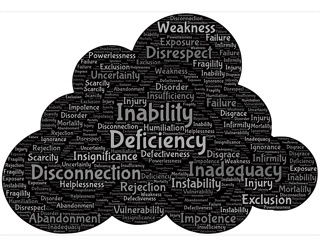
Many different factors can cause anxiety. One little-known cause is a genetic variation that prevents your brain from making enough GABA, a calming brain chemical that prevents anxiety. You can do a simple test with a supplement to find out if this genetic variation affects you.
GABA: The brain chemicals that prevents anxiety
When GABA is low, anxiety goes up, it’s difficult to sleep, and you always feel like you’re in a hurry or living under the threat of imminent doom.
GABA is made from another brain chemical called glutamate. Glutamate is the opposite of GABA in that it is excitatory and stimulating to the nervous system. Both are necessary for healthy brain function. Ideally, they operate in concert with one another, keeping the brain both sufficiently stimulated and calmed as necessary.
However, many disorders today, including anxiety, involved excess glutamate and insufficient GABA. Excess glutamate not only over stimulates the nervous system, it is also toxic to the brain and can age, or degenerate, it too quickly.
The alpha-ketoglutaric acid challenge to screen for genetic cause of anxiety
A variety of factors can cause excess glutamate, however, for some it is faulty conversion of glutamate to GABA that is genetic. Consider this possibility if you have a family history of anxiety.
You can test whether you have this genetic conversion variation with a supplement called alpha-ketoglutaric acid (AKG). The body makes AKG into glutamate, some of which will be made into GABA, unless you have this genetic issue.
How to do the AKG challenge
To perform the challenge, take 3,000 to 4,000 mg of alpha-ketoglutaric acid. Some people have a response after taking it once; others have to take it for several days to respond. Use trial and error to test it.
If you do not have this genetic conversion issue, the AKG will cause either no symptoms or perhaps a little extra energy from the increased glutamate production, but not anxiety.
For the person with the genetic variation, however, the surge of glutamate production combined with the genetic inability to convert it to GABA will cause excitability, nervousness, anxiety, insomnia, and other GABA-deficiency symptoms.
If you have a positive result with the AKG challenge
If the AKG gave you anxiety or insomnia, then you know a perpetual GABA shortage may be an issue for you. Taking GABA support on a regular, lifelong basis may help alleviate symptoms of anxiety, insomnia, nervousness, and catastrophic thinking.
Compounds that work well to support GABA pathways include l-theanine, l-taurine, vitamin B6, valerian, passion flower, and lithium orotate. These can be taken regularly.
Be careful with drugs that increase GABA, such as benzodiazepenes (Valium, Xanax, etc.) They cause many people to build a tolerance to them and withdrawal can be extremely difficult.
Some supplements such as phenibut act like benzodiazepenes and can also cause tolerance if taken regularly, so be mindful of those. Straight GABA is too large to cross the blood-brain barrier, so if it works, then this may indicate you have a leaky blood-brain barrier, which is commonly associated with leaky gut. Also, taking straight GABA regularly can cause you to build a tolerance as well.
Regular exercise, stress-reducing techniques, blocking blue light at night avoiding foods or supplements that raise glutamate (such as MSG or artificial sweeteners), stabilizing blood sugar, and avoiding foods that cause an immune reaction are some other ways to manage your anxiety naturally.



Latest from the Blog
Breaking Through Cancer Barriers: News Outlets Spotlight High-Dose Vitamin C Therapy
December 5, 2024https://www.yahoo.com/news/pancreatic-cancer-patient-survival-doubled-152722177.html Harnessing the Power of High-Dose Vitamin C in Cancer Treatment Recent advances in cancer treatment research have brought renewed attention to high-dose intravenous (IV) vitamin C, particularly in extending survival rates for patients with advanced different forms of cancer. A groundbreaking phase 2 clinical trial Study Finds demonstrated that combining high-dose IV vitamin C […] Read more
Latest from the Blog
The Dirty Dozen
The “Dirty Dozen” is a list of fruits and vegetables, compiled by the Environmental Working Group (EWG), that you should always eat organically. These produce items are not only delicious and nutrient-rich but also tend to carry high levels of pesticide residues when grown conventionally. By opting for organic versions, you can significantly reduce your […] Read more